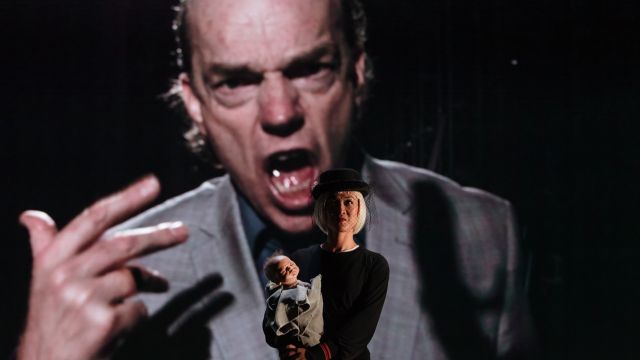The Resistable Rise Of Arturo Ui
Brecht wrote this diatribe about a gangster-turned-political saviour when in exile back in 1941, as the rise of Hitler looked assured.
He wanted audiences to see the fragility of our democratic institutions, and the urgency for vigilance against the honeyed, fake truths of the next brute to turn demagogue. He would love this version directed so sharply by the STC’s Kip Williams.
First, Hugo Weaving is outstanding as Ui, the heartless mastermind running a protection racket in the city’s vegies market, but who – with the help of a theatre director (an arch Mitchell Butel) – transforms himself into a slick, be-suited master of Orwellian shibboleths.
Once Brecht got used to them, like us, he would also admire the live projections from onstage cameras, intercutting our focus from theatre to screen: here perfectly integrating another medium to question the performative lies of power. Weaving works the cameras, of course, as well as he does us.
And Brecht would (or should!) love Tom Wright’s artful adaptation. It’s a moral thriller in a corruptible contemporary city like – but not exactly – Sydney, mixing Cockney accent and diverse Aussie characters, and the dead empty slogans of recent local and global leaders with rich Shakespearean villainy.

It may look like Richard III in Gotham City, but from the Philippines via Moscow to Washington, it could be any of these bullies.
Ui’s relentless takeover of high business, politics, justice and the media takes a few implausible, melodramatic leaps, but here through the camera eyes of a B-Grade movie, it works as a gothic tale which grabs you by the throat.
Squeezing out the blood is Colin Moody as Ui’s enigmatic henchman, Peter Carroll as the corruptible chief minister, Anita Hegh as an innocent seduced by Ui, all fine performances well supported by Tony Cogin, Ivan Donato, Brent Hill, Monica Sayers, Charles Wu and Ursula Yovich.
Designer Robert Cousin delivers an empty space with a few iconic props and dark character-rich costumes, punctuated by Nick Schlieper’s lighting. A vital credit is cinematographer Justine Kerrigan and her team. It’s more than two hours, non-stop and flags not a bit.
Martin Portus
Photographer: Daniel Boud.
Subscribe to our E-Newsletter, buy our latest print edition or find a Performing Arts book at Book Nook.

